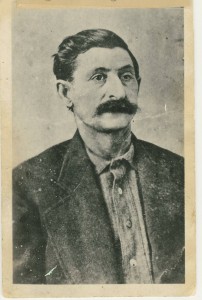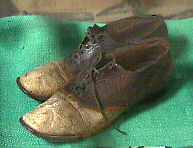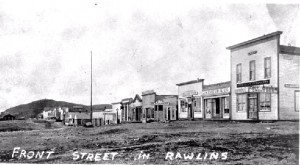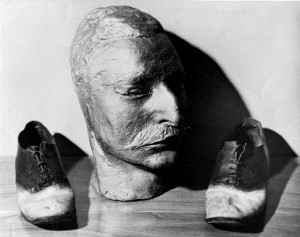Sometimes when you're out on the trail you find a story so bizarre it bears repeating. This blog was posted back in 2013 when I was a guest here at Sweethearts of the West. But if there's a tale that's bizarre and deserves a repeat it's that of Big Nose George.
 We
don’t know much about George Parrot other than he was a cattle rustler,
and then joined a gang. Known for his large nose and therefore called
Big Nose George, he was a member of a gang of road agents and horse
thieves. The leader of the gang was a man named Sim Jan, and they were
active in the Powder River country, robbing pay wagons and stagecoaches.
Other gang members included: Frank McKinney, Joe Manuse, Jack Campbell,
John Wells, Tom Reed, Frank Tole, and “Dutch Charley” Burress.
We
don’t know much about George Parrot other than he was a cattle rustler,
and then joined a gang. Known for his large nose and therefore called
Big Nose George, he was a member of a gang of road agents and horse
thieves. The leader of the gang was a man named Sim Jan, and they were
active in the Powder River country, robbing pay wagons and stagecoaches.
Other gang members included: Frank McKinney, Joe Manuse, Jack Campbell,
John Wells, Tom Reed, Frank Tole, and “Dutch Charley” Burress.After a series of successful robberies, the gang decided to expand their operation to robbing trains. On August 16, 1878, they planned to rob a Union Pacific train near Medicine Bow by manipulating the tracks so the train would derail. However, as the outlaws waited in the brush for the train, a section crew from the railroad came along and discovered the tampered rail.
Frank McKinney wanted to shoot the rail crew, but Big Nose George and Frank Tole objected, saying they hadn’t come to kill. As the crewmen repaired the track, a railroad foreman rode ahead to stop the approaching train and inform the law that the rail had been tampered with. Forced to abort the robbery, the outlaws watched helplessly as the track was repaired. After the workers left, the gang rode off.
A posse was hastily formed and rode out to apprehend the would-be train robbers. Two lawmen tracked the gang to Rattlesnake Canyon in Elk Mountain. The outlaws shot and killed both lawmen. Wanted now for attempted robbery and the murder of two lawmen, the outlaws went their separate ways.
One of the victims killed that day was Robert Widdowfield. Widdowfield was born in County Durham, England, the son of a miner. In 1870, when Widdowfield was twenty-one, the family moved to America and settled in Wyoming where Robert became a deputy sheriff in Carbon County. On August, 19, 1878, he became Wyoming’s first officer to be killed in the line of duty.
The Union Pacific Railroad doubled their efforts in tracking the gang members and county authorities offered a $10,000 reward for their capture. Frank Tole was killed the next month while attempting to rob the Black Hills Stage line.
“Dutch Charley” was apprehended in 1879. However, when the westbound train transporting the outlaw to Rawlins for trial passed Carbon it was stopped by a mob. “Dutch Charley" was forcibly taken from the train and hanged from a telegraph pole, with one of the widows kicking the barrel out from under “Dutch Charley” and ending his career.
Two years later in Miles City, Montana, Big Nose George, in a drunken stupor, bragged about killing two Wyoming lawmen. A telegraph was sent to Rawlins, and in July, 1880, Sheriff James Rankin of Carbon County went to Montana to collect his prisoner and bring George back to Wyoming. A second time, the train bringing a gang member back was stopped in Carbon by the same mob that lynched “Dutch Charley.” Big Nose was hauled off the train and prepared for hanging. But the outlaw confessed and pleaded for his life, promising to tell all he knew if they let him live. The vigilantes cut him down and he was allowed to continue the journey to Rawlins to stand trial.
When he arrived in Rawlins, he recanted his confession after he was told if he pleaded guilty there would be no trial if his plea was accepted and he would face a mandatory death sentence. His trial began in November of 1880, and he again changed his plea to guilty. The plea was accepted and on December 15, 1880, he was sentenced to hang on April 2, 1881.
While Big Nose was in jail, he stated Frank McKinney claimed to be Frank James, which led to some speculation that Frank McKinney and the gang’s leader, Sim Jan, were Frank and Jesse James. The only gang members ever caught were: Frank Tole, “Dutch Charley,” and Big Nose George. McKinney, Jan and the rest of the gang disappeared.
George attempted to escape on March 22, 1880. Parrot managed to file the rivets of the heavy shackles on his ankles, using a pocket knife and a piece of sandstone. After removing his shackles, he hid until jailor Robert Rankin (brother of Sheriff James Rankin) entered the area. Big Nose struck Robert Rankin with the shackles, fracturing his skull, but Rankin fought back and called out to his wife, Rosa. Rosa grabbed a pistol and forced Big Nose back into his cell.
News of the attempted escape spread through Rawlins, and a mob descended on the jail determined to see Big Nose hang. They dragged Big Nose George from the jail to a telegraph pole on what is now Front Street. A crowd of about 200 people gathered. The first effort using a Kerosine barrel was unsuccessful. On the second attempt, Big Nose was made to ascend a ladder leaning against a telegraph pole. When the ladder was pulled out from under him, Big Nose managed to get his hands free and clung to the pole begging for someone to have mercy and shoot him. No one did. Tired, Big Nose let go and strangled to death.
 The body was left hanging for hours until the undertaker cut it down. With no family to claim
the body, Doctors Thomas Maghee and John Osborne took possession of it.
The doctors wanted to study the outlaw’s brain for the purpose of
determining whether there were any visible criminal abnormalities. The
skull cap was removed and given to Lillian Heath (later Lillian Nelson),
a fifteen-year-old apprentice of Dr. Maghee. Heath, who became the
first woman doctor in Wyoming, used the skull cap as an ashtray, pencil
holder and doorstop until her death. Though Dr. Maghee acted within the
medical ethics of the time, Dr. Osborne’s activities became bizarre.
The body was left hanging for hours until the undertaker cut it down. With no family to claim
the body, Doctors Thomas Maghee and John Osborne took possession of it.
The doctors wanted to study the outlaw’s brain for the purpose of
determining whether there were any visible criminal abnormalities. The
skull cap was removed and given to Lillian Heath (later Lillian Nelson),
a fifteen-year-old apprentice of Dr. Maghee. Heath, who became the
first woman doctor in Wyoming, used the skull cap as an ashtray, pencil
holder and doorstop until her death. Though Dr. Maghee acted within the
medical ethics of the time, Dr. Osborne’s activities became bizarre.Osborne first molded a death mask of George’s face using plaster of paris. The mask was without ears because while George struggled at the end of the rope his ears were torn off.
Next, Osborne removed the skin from the dead man’s thighs and chest, which he shipped to a tannery in Denver with a set of grotesque instructions. The tannery was to use the skin, including the nipples, to make him a pair of shoes and a medicine bag. When Dr. Osborne received the shoes, he was disappointed to find they didn’t include the nipples, but proudly wore them despite his instructions not being followed.
The rest of Big Nose George’s dismembered body was kept in a whiskey barrel filled with a salt solution for about a year as Osborne continued his dissection and experiments. Finally, the whiskey barrel was buried by Osborne’s office in Rawlins.
Despite this odd behavior, Osborne was elected as Wyoming’s first Democratic governor, in 1892. Although, the circumstances surrounding his election are a bit sketchy, and it is often said he sneaked into office when the Republicans weren’t looking. Returns from Converse and Fremont Counties were delayed, and the State Canvassing Board was unable to certify the results. Taking matters in his own hands, Osborne took the oath of office on December 2, before a notary public and allegedly crawled along a ledge of the State House and in through the window into the Governor’s Office and refused to leave. The scene culminated with a wrestling match between Acting Governor Barber’s secretary and Osborne for the key to the office.
 Governor
Osborne wore the shoes made of George’s skin to his inaugural ball,
which seems fitting since it appears he was as much a criminal as Big
Nose.
Governor
Osborne wore the shoes made of George’s skin to his inaugural ball,
which seems fitting since it appears he was as much a criminal as Big
Nose.Big Nose George was all but forgotten until May 11, 1950, when a construction crew excavating for a new building unearthed a whiskey barrel filled with bones. Included in the mass of bones was a skull with the top sawed off.
A citizen recalled Dr. Lillian Heath Nelson kept a skull cap. Nelson was still alive, but well into her eighties. Her family was contacted and her husband brought the skull cap to the scene, it fit perfectly with the skull found in the barrel. Subsequent DNA testing has occurred and verified the results.
Today if you’ve got a hankerin’, the Carbon County Museum in Rawlins displays Big Nose George’s death mask, his skull and the infamous shoes. Also on display, is a watch given by the County Commissioners to Rosa Rankin for stopping Big Nose’s escape. The shackles used on Big Nose during his hanging and the skull cap are on display at the Union Pacific Museum in Omaha, Nebraska. The medicine bag has never been found.
Not a pretty story, but if your looking for something a little different to see on the trail head on over to Rawlins and take a look at man-shoes!
SOURCES:
http://www.wyomingtalesandtrails.com/rawlinsa.html
http://www.legendsofamerica.com/wy-bignose.html
http://www.carboncountymuseum.org/bignose.html
Kirsten Lynn is a Western and Military Historian. She worked six years with a Navy non-profit and continues to contract with the Marine Corps History Division for certain projects. Making her home where her roots were sewn in Wyoming, Kirsten also works as a local historian. She loves to use the history she has learned and add it to a great love story. She writes stories about men of uncommon valor…women with undaunted courage…love of unwavering devotion …and romance with unending sizzle. When she’s not writing, she finds inspiration in day trips through the Bighorn Mountains, binge reading and watching sappy old movies, or sappy new movies. Housework can always wait.





Governor Osbourne wore a pair of shoes made from Big Nose's skin to his Democratic Inaugural Ball? Ewww!!!
ReplyDeleteIndeed, Big Nose was a strange character, and yes, a big outlaw. His entire life is intriguing.
Truth is, indeed, stranger than fiction.
Good post!
Thanks, Celia. It's quite a gruesome tale. I don't know who was worse George or Osbourne? Like you said, truth is stranger than anything we can make up.
DeleteLordy, people sure could be gross. It's kind of creepy the things they did to dead people and the suffering they allowed. I think it's so bazaar the rituals they did, like the death mask. Ick!
ReplyDeleteI remember Big Nose George's story. It is a fascinating one.
I wonder if Big Nose Kate was a relative. I know they weren't, but people sure liked to make up names about people based on physical features back then.
Well, this was certainly an interesting post, Kirsten.
I agree, Sarah, creepy is the word. I remember reading about Big Nose George at the museum in Jackson and have been morbidly fascinated ever since.
DeleteYes, you didn't want any features that stood out back then, of course it's rough if you do even today.